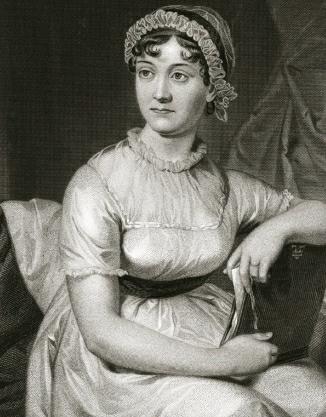简·奥斯汀逝世200周年:我们应阅读她的哪部作品?
By+Sam+Jordison
On the 18 July 1817, Jane Austen died in Winchester, after a long, painful illness. Her brother James arranged for her to be buried in the cathedral. The inscription2 on her tomb reads:
In Memory of JANE AUSTEN, youngest daughter of the late Revd GEORGE AUSTEN, formerly Rector of Steventon in this County.3 She departed this Life on the 18th of July 1817, aged 41, after a long illness supported with the patience and the hopes of a Christian. The benevolence of her heart, the sweetness of her temper, and the extraordinary endowments of her mind obtained the regard of all who knew her and the warmest love of her intimate connections.4 Their grief is in proportion to their affection, they know their loss to be irreparable, but in their deepest affliction they are consoled by a firm though humble hope that her charity, devotion, faith and purity have rendered her soul acceptable in the sight of her REDEEMER.5
Touching words—and perhaps it is unusual for a woman of Austens time to be complimented6 for the “endowments of her mind”. But viewed from the 21st century, there is a glaring omission.7 Why did James fail to mention that his sister was one of the greatest writers who has ever lived?
Yes, he had no way of knowing that she would be remembered hundreds of years later for helping invent the English novel and as one of the finest observers of the human heart and social customs. But why did he not think it was worth mentioning that Austen was an exquisite prose stylist?8 Surely he could have mentioned her way with zingers9? Just look at them:“For what do we live, but to make sport for10 our neighbours and laugh at them in our turn?” Or this:“Nobody minds having what is too good for them.”Or: “It was a delightful visit;—perfect, in being much too short.”
I could happily spend this whole article rooting out11 Jane Austen quotes, but the chances are youve read them all. She is central to our culture—so much so, you might think it will be a challenge to find something new to discuss. What hasnt already been said about Austen?
But Im not worried. Like all great authors, Austen holds a mirror up to our times as much as to her own. Shes always relevant12, but also very much of her time. Reading the famous opening lines of Pride and Prejudice, who today would still believe “it is a truth universally acknowledged, that a single man in possession of a good fortune must be in want of a wife”? Austen shows that, even in 1813, things were a little more complicated than that exquisite phrasing suggests, but it is fascinating to read of such a society from a completely different vantage point13.endprint
Speaking of the passing of time, Im also curious to see how it feels to read Austen again. Its more than 20 years since I read anything she wrote. Some time in the mid-90s I ground out my last A-level paragraph about dramatic irony in Emma, put away my pen with relief, started reading On the Road—and didnt look back.14 I suspect there are plenty of other people in a similar situation, so it will be fascinating to engage with15 her again(especially free from the shadow of exams). Im hoping to discover all sorts of new things in her books, and I might even catch a few jokes that were too subtle for me when I was 18.
In short, Im looking forward to it. The only question is which book to read. I think the simplest and best way to decide will be to list all of her novels. They are (in order of publication):
1. Sense and Sensibility
2. Pride and Prejudice
3. Mansfield Park
4. Emma
5. Northanger Abbey
6. Persuasion
7. Lady Susan
Lady Susan was a short epistolary16 novel written while Austen was a teenager, but published in 1871. If it rouses17 your curiosity, I dont see why we cant count it in. Otherwise, there are six classics to choose from.
One more classic quote from Austen, which I include without comment: “The person, be it gentleman or lady, who has not pleasure in a good novel must be intolerably18 stupid.”
1817年7月18日,在經历痛苦疾病的长期折磨之后,简·奥斯汀在英国汉普郡温切斯特逝世。随后,兄长詹姆斯将她安葬于温切斯特大教堂。她的碑文这样写道:
怀念简·奥斯汀,本郡史蒂文顿教区已故牧师乔治·奥斯汀的小女儿。1817年7月18日,简·奥斯汀与世长辞,年仅41岁。在此之前,她虽长期患病,但始终坚强隐忍,同时不忘作为一名基督教徒的信仰。她内心仁慈、性情甜美、才华过人,令所有认识她的人都钦敬不已,亲人对她也怀有无比温柔的爱。此刻,悲伤随着爱意一同加深。失去简给他们带来的痛苦是难以修复的,但在他们最为痛苦的内心深处,仍怀有一丝欣慰,他们卑微但坚定地希望,简·奥斯汀那博爱、热忱、真诚与纯粹的灵魂能够在救赎主面前蒙悦。
字里行间无不感人肺腑——而且在奥斯汀所处的年代,给予女性“才华过人”的褒奖也许并不多见。但以21世纪的视角来看,铭文却有很明显的疏漏。为什么詹姆斯没有提及自己的妹妹是有史以来最伟大的作家之一呢?
是的,他当然无从知晓奥斯汀在几百年后仍为读者所铭记。这不仅因为她帮助开创了英国小说的历史先河,也因其作品对人心与世俗的深刻洞察。但是,为什么他认为奥斯汀长于创作精美散文的作家身份不值得一提呢?他本可以提及奥斯汀那些一语中的文字不是吗?看看这几句话:“我们为何而活?不就是给邻居当笑柄,再反过来笑笑他们?”或者:“没人介意拥有对自己极好的东西。”又或者“这是一次愉快的拜访;——完美,只因太短暂。”
我本来很乐意用整个篇幅将简·奥斯汀所说过的名言列举出来,但有可能你已经全部读过了。她是我们文化的核心——她如此重要,以至于你可能会觉得,找出点儿有新意的东西来讨论是个极大的挑战。关于奥斯汀,还有什么未被挖掘的呢?
但我并不担心。像其他所有伟大的作家一样,奥斯汀的作品像一面镜子一样反照了她自己的以及我们的时代。她的观点总是中肯切题,同时不乏其时代特点。《傲慢与偏见》的开场白广为人知:“凡是有钱的单身汉,总想娶位太太,这已经成了一条举世公认的真理。”而如今,谁还会将此奉为信条呢?简·奥斯汀告诉读者,即便是在1813年,事情也比她用精致措辞所表达的情况更复杂一些。但是,从完全不同的角度来解读这样的社会,也非常吸引人。
谈及时光的流逝,我也好奇重读奥斯汀会有什么感受。自我上次阅读她的作品已有二十余年。上世纪90年代中期,我苦心孤诣地写完了一篇关于“《爱玛》中的戏剧讽刺手法”的A-level课程论文的最后一段,然后如释重负地放下笔,接着开始阅读《在路上》——此后我便再没回头看过奥斯汀的作品。我猜想和我有类似情况的人还很多,所以,重读简·奥斯汀一定是件非常吸引人的事情(尤其是在没有考试阴影的情况下)。我期待能够在她的作品中重新发掘各种新鲜元素,而且我甚至还可能理解一些在我18岁时还曾觉得过于微妙的笑话。endprint
简言之,我对此满心期待。唯一的问题就是,应该选择读哪本书。我认为,最简单有效的决定方式就是列出她所有的作品以供选择。作品如下(按出版顺序排列):
1. 《理智与情感》
2. 《傲慢与偏见》
3. 《曼斯菲爾德庄园》
4. 《爱玛》
5. 《诺桑觉寺》
6. 《劝导》
7. 《苏珊夫人》
《苏珊夫人》是奥斯汀青少年时期写就的一篇简短的书信体小说,迟至1871年才发表。如果它能激发出你的兴趣,不妨把它也算进去。如果不算的话,也还有六部经典之作可供选择。
我在此列出奥斯汀的另一句经典名言但不作评论:“不论男士还是女士,如果阅读优秀的小说都不能使其感到愉悦,那他或她一定愚蠢得令人无法忍受。”
1. bicentenary: 两百周年(纪念)。
2. inscription: 铭文,碑文。
3. late: 已故的;Revd: Reverend的缩写,牧师的尊称;rector:(英国国教教会的)教区长。
4. benevolence: 乐于行善,仁慈;endowment: [常作复数] 天资,天赋。
5. irreparable: 不能挽回的,不能修补的;affliction: 痛苦,折磨;charity:博爱仁慈,善良宽厚;render: 使得;Redeemer: // 耶稣基督,救世主。
6. compliment: 恭维,称赞。
7. glaring:(错误)明显的;omission:疏漏。
8. exquisite: 高雅的,细腻的;stylist:注重作品风格的作家,文体家。
9. zinger: 击中要害的话,简短无礼却幽默的评论。
10. make sport for: 给他人当笑柄,成为某人的笑柄。
11. root out: 根除,连根拔起。这里作比喻,指“一一列举”。
12. relevant: 中肯的,切题的。
13. vantage point: 立场,观点。
14. grind out: (尤指单调地或艰难地)大量生产;A-Level: 英国高中课程(General Certificate of Education Advanced Level),也是英国学生的大学入学考试课程;On the Road:《在路上》,是美国“垮掉的一代”代表作家杰克·凯鲁亚克创作于1957年的小说。这部小说绝大部分是自传性的,被公认为上世纪60年代嬉皮士运动和垮掉一代的经典之作。
15. engage with: 融入其中。
16. epistolary: //(小说)书信体的。
17. rouse: 激起(情感)。
18. intolerably: 令人难耐地,无法忍受地。endprint

